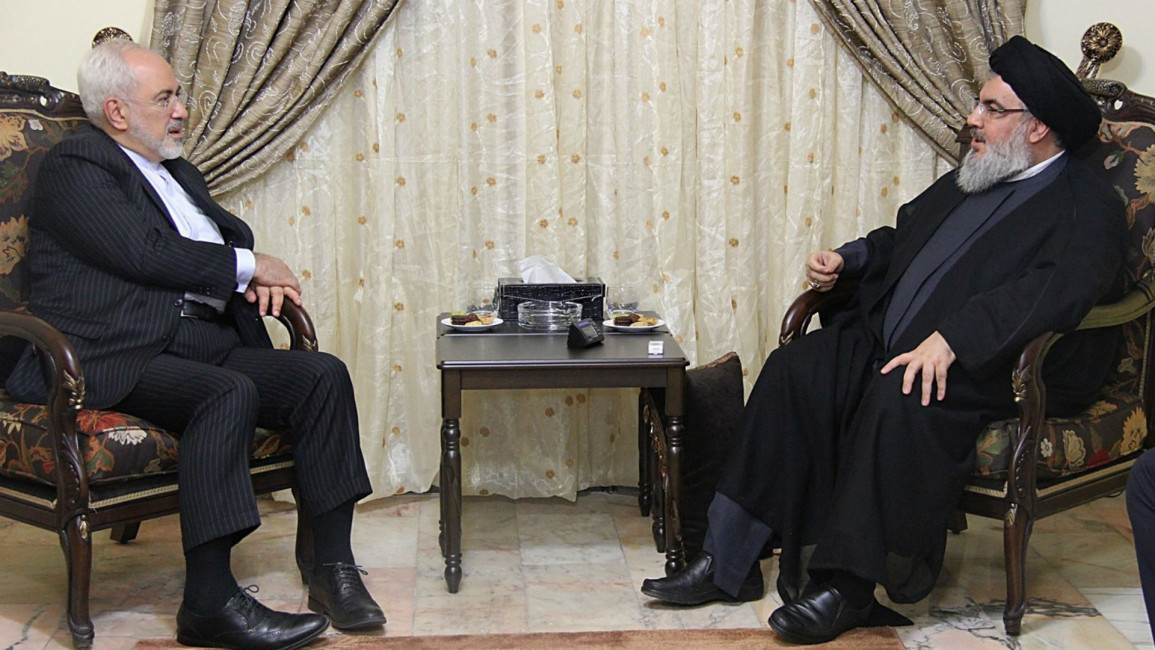Iran's Zarif meets Nasrallah in Lebanon, heads to Damascus
Iran's Zarif meets Nasrallah in Lebanon, heads to Damascus
Iran's FM Mohammad Javad Zarif was heading to Damascus Wednesday after talks with Hassan Nasrallah Secretary General of Lebanon's Hizballah movement as Tehran maintains diplomatic charm offensive.
2 min read
Zarif (L) discussed solutions to local and regional crises with Hizballah's Nasrullah [Getty]
Iran's foreign minister is heading to Syria Wednesday after arriving in Lebanon Tuesday in his first visit to the two countries since negotiating Tehran's landmark nuclear deal with world powers.
Speaking on his arrival in Beirut on Tuesday, Mohammad Javad Zarif said he hoped the nuclear deal between his country and world powers would “pave the way to opening a new chapter of ties between countries in the region,” according to Lebanon’s Naharnet news website.
Diplomatic sources told Lebanon’s al-Joumhouriya newspaper that Zarif wanted to send a message that Iran would not turn its back on Hizballah and Syria after the nuclear deal Iran signed with world powers last month.
The nuclear deal between Iran and six world powers is meant to restrict Iran’s nuclear programme in return for the lifting of sanctions.
In Lebanon, Zarif met with Prime Minister Tamam Salam, Speaker Nabih Berri, Foreign Minister Jebran Bassil, and senior politicians from the country’s pro-Syrian March 8 and anti-Syrian March 14 alliances.
He also met with Hizballah Secretary-General Hassan Nasrallah.
Hizballah's al-Manar television station said Nasrallah and Zarif discussed attempts "to find solutions in more than one country", in an apparent reference to Lebanon's failure to elect a president since last year and the brutal civil war neighbouring Syria.
To Damascus
Zarif is scheduled to arrive in Damascus Wednesday afternoon, likely to discuss a four-point peace plan proposal Iran wants to offer to the United Nations to end Syria's grinding civil war.
However many doubt the plan, which reportedly includes a cease-fire and a "national unity government," is capable of ending a conflict that has killed more than 250,000 people since March 2011.
The rebel shelling began around morning rush hour in Damascus, with more than 50 shells striking the capital, including in the upper-class neighbourhoods of Abu Rummaneh, Baramkeh and Qasaa, the UK-based Syrian Observatory for Human Rights said.
The attacks come amid Iranian diplomatic efforts to end the conflict. Iran is one of Assad's strongest supporters and the Iranian-backed Lebanese militant group Hizballah has sent thousands of fighters to Syria to back government forces.
Speaking on his arrival in Beirut on Tuesday, Mohammad Javad Zarif said he hoped the nuclear deal between his country and world powers would “pave the way to opening a new chapter of ties between countries in the region,” according to Lebanon’s Naharnet news website.
| Zarif wanted to send a message Iran would not turn its back on Hizballah and Syria after the nuclear deal Iran signed with world powers last month. |
The nuclear deal between Iran and six world powers is meant to restrict Iran’s nuclear programme in return for the lifting of sanctions.
In Lebanon, Zarif met with Prime Minister Tamam Salam, Speaker Nabih Berri, Foreign Minister Jebran Bassil, and senior politicians from the country’s pro-Syrian March 8 and anti-Syrian March 14 alliances.
He also met with Hizballah Secretary-General Hassan Nasrallah.
Hizballah's al-Manar television station said Nasrallah and Zarif discussed attempts "to find solutions in more than one country", in an apparent reference to Lebanon's failure to elect a president since last year and the brutal civil war neighbouring Syria.
To Damascus
Zarif is scheduled to arrive in Damascus Wednesday afternoon, likely to discuss a four-point peace plan proposal Iran wants to offer to the United Nations to end Syria's grinding civil war.
However many doubt the plan, which reportedly includes a cease-fire and a "national unity government," is capable of ending a conflict that has killed more than 250,000 people since March 2011.
The rebel shelling began around morning rush hour in Damascus, with more than 50 shells striking the capital, including in the upper-class neighbourhoods of Abu Rummaneh, Baramkeh and Qasaa, the UK-based Syrian Observatory for Human Rights said.
The attacks come amid Iranian diplomatic efforts to end the conflict. Iran is one of Assad's strongest supporters and the Iranian-backed Lebanese militant group Hizballah has sent thousands of fighters to Syria to back government forces.



